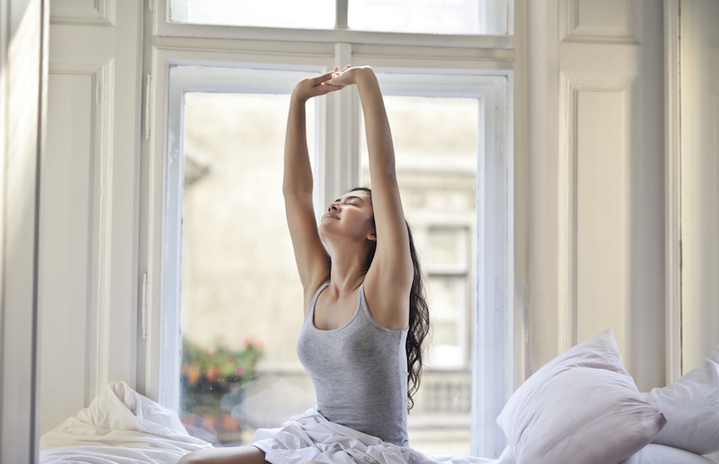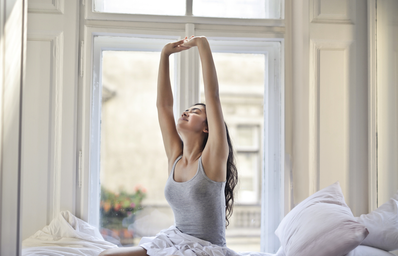Congratulations! After spending most of your youth in full-time education, you’ve now acquired the most valuable life skills; knowing Pythagoras theorem, the step-by-step formation of an oxbow lake, or arguably the most important, how to play the recorder. I really don’t know where I’d be without that. You’re taught how to pass your GCSEs, go to uni and get a job. You’re not taught how to navigate adult life whilst your body is constantly changing in ways, you’re probably completely unaware of. And yet, somehow, we’re expected to just deal with these turbulent fluctuations and not utter a single complaint. Man up.
There are days where, despite all my efforts to maintain a healthy lifestyle, my body feels like it’s fighting against me. Exhaustion despite getting 9 hours of sleep. Bloating despite doing everything TikTok has told me to heal my gut. Feeling low despite exercising and spending time with friends. However, once I discovered what school doesn’t teach you about being a woman, I felt comfort in knowing that the discomfort is completely natural and manageable.
Women go through a second puberty in their 20s. Now, whilst this isn’t a medical term, it’s still used to describe the significant hormonal and emotional changes that our bodies endure upon arrival to womanhood. Weight gain is natural. Growing from a girl’s body into a woman’s is obviously going to carry some changes and, thinking logically, we probably won’t be wearing the same size clothes as our 16-year-old selves forever. Growing into a woman’s body also means growing into its skin, so stretch marks are also normal. That’s why drinking lots of water is important to keep the skin healthy and elastic. If you escaped acne in your first puberty, second time round you might not be so lucky. Breakouts can occur whilst your hormones are trying to figure themselves out. And just like your hormones, you too might be trying to figure yourself out. At the same time our bodies are changing, out of our control, we’re experiencing other huge life shifts like finishing uni, starting a new job, and losing and gaining relationships along the way. Feeling anxious or down about adjusting to your new situation is okay.
But we shouldn’t be scared of these changes. Your 20s are when you’re strongest as a woman. Increase in bone mass and muscle strength brings power and power brings confidence. You’re becoming a strong woman. You’re not a little girl anymore. Revel in these changes and know that they’re not because of something you’re doing wrong in life, they’re natural and happen to all of us.
Let’s talk periods. A period has 4 phases, menstruation is just one of them, and each phase has different needs when it comes to food and exercise. When that time of the month comes around, you might think you’re coping fine with a tub of Ben and Jerry’s in bed, but managing the physical and emotional symptoms of a period is actually a month-long job. Menstruation occurs days 1-5. Prioritise foods that boost your magnesium and iron levels (dark leafy greens, bananas, dark chocolate), and those rich in fatty acids (avocados, oily fish). Swap high impact exercise for something more gentle, like yoga or pilates. Your body is already working hard in the bleeding phase so catch up on sleep to avoid fatigue. Next, the follicular phase, days 5-13. Your body is preparing to release an egg, so it needs to be nourished with whole foods. Incorporate a lot of protein into your meals. Also take advantage of your energy level being at its peak. Ovulation is days 14-16. As the egg is released and travelling to your uterus you may feel a sharp pain in your side. I was shocked when I discovered this but what you’re feeling is the ripe egg physically popping out of an ovary. Yoga postures can ease this stiffness and open your hips. You might also feel hotter than usual during this phase as your body temperature rises by 0.5 degrees. Lastly, the luteal phase. Protein dense foods are important here to prepare your body for bleeding again. Brown rice, ginger and turmeric are particularly useful. Alcohol and caffeine actually exacerbate symptoms of PMS by draining the body of nutrients it needs for this next phase so put down the ice coffee and swap for something more hydrating. Light exercise like jogging is encouraged to help balance mood. As your body begins to slow down you may feel more introverted than usual. Listen to your body and give yourself some rest.
Speaking of rest, as a woman, you need more sleep than any man you know. At last, I can settle the ongoing debate with my boyfriend that, yes, I do need to snooze for half an hour longer than you in the morning. Women’s brains are wired differently. As we’re capable of multi-tasking, our brains are more flexible and active throughout the day, using more of the brain than men – there’s a surprise. This leads us to have a longer circadian rhythm, with men only needing 7-8 hours and women requiring 8-10 hours. Our melatonin even rises a lot quicker than men at night. Sleep cycles are governed by hormones, and since women experience a lot more hormonal changes throughout the month, it impacts our quality of sleep.
So yes, you’ll be changing, yes, it might feel scary, but not a day goes by without you getting stronger, and personally, that’s exciting.


